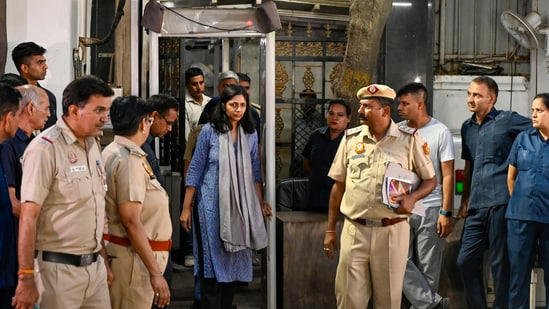In a recent turn of events that has further intensified the political drama in Delhi, the Aam Aadmi Party (AAP) has alleged that Delhi Commission for Women (DCW) Chairperson Swati Maliwal filed a First Information Report (FIR) against Bibhav Kumar, an advisor to Delhi Chief Minister Arvind Kejriwal, in retaliation to an Anti-Corruption Branch (ACB) investigation against her. This development marks a significant escalation in the ongoing tussle within the political landscape of Delhi, where accusations of corruption and vendetta politics have become routine.
Swati Maliwal, known for her vocal advocacy on women’s issues and her tenure as the head of the DCW, has faced scrutiny from various quarters over the years. Recently, she has been under investigation by the ACB for alleged irregularities and corruption in the functioning of the DCW. These investigations have put Maliwal under considerable pressure, leading to suspicions and counter-allegations from multiple political figures and institutions.
The FIR filed by Maliwal against Bibhav Kumar accuses him of sexual harassment. This accusation has sparked a fresh controversy, with AAP leaders suggesting that the timing and nature of the complaint are suspicious. They argue that the FIR is a retaliatory move by Maliwal to divert attention from the ACB’s investigation into her activities.
AAP spokespersons have been vocal about their belief that Maliwal’s actions are politically motivated. They argue that the ACB’s probe, which they claim is baseless and politically orchestrated by rival parties, has pushed Maliwal to act out of desperation. According to AAP, the FIR against Bibhav Kumar is not grounded in fact but is instead a strategic attempt to discredit and distract from the real issues at hand. Senior AAP leader and Delhi Deputy Chief Minister, Manish Sisodia, stated, “It is evident that the FIR is a reaction to the ACB’s baseless allegations against Swati Maliwal. This is a clear case of vendetta politics where innocent people are being dragged into false cases to malign their reputation.”
In her defense, Swati Maliwal has stood by her decision to file the FIR, asserting that the allegations of sexual harassment are serious and warranted immediate action. Maliwal has denied any connection between her complaint and the ACB investigation, stating that the charges against Bibhav Kumar are based on genuine grievances that needed to be addressed. Maliwal responded to the accusations of vendetta by saying, “Sexual harassment is a grave issue and should never be trivialized or politicized. My complaint is based on actual incidents and evidence. Any suggestion that this is a retaliatory act undermines the seriousness of the harassment claims and is deeply disrespectful to all victims of such behavior.”
The controversy surrounding these allegations has significant political implications. It highlights the ongoing power struggles and the volatile nature of politics in Delhi. Both sides have attempted to frame the narrative to their advantage, leading to a broader debate on corruption, integrity, and the misuse of power within political and administrative spheres. The ACB’s role in this scenario is also under scrutiny. Critics argue that anti-corruption bodies can sometimes be used as tools for political witch-hunts, further complicating the discourse around corruption and accountability in governance.
The public reaction to this controversy has been mixed. Supporters of AAP view the FIR as an unwarranted attack on a key advisor to the Chief Minister, seeing it as a tactic to undermine the party’s credibility. On the other hand, supporters of Swati Maliwal emphasize the importance of taking allegations of sexual harassment seriously, regardless of the political context.
As the investigation progresses, the truth behind the allegations and counter-allegations may become clearer. For now, the case serves as a stark reminder of the complexities and challenges of navigating the intersection of governance, activism, and politics. It underscores the need for transparency, fairness, and integrity in addressing both corruption and harassment claims to maintain public trust in democratic institutions.

